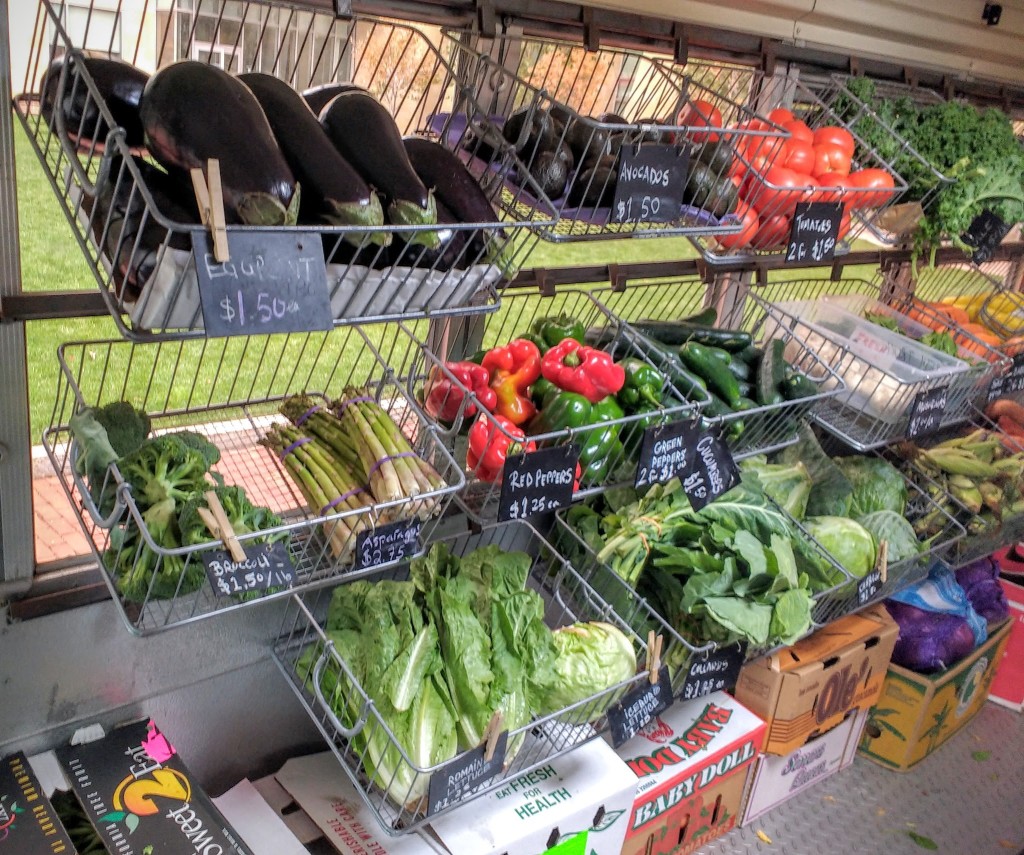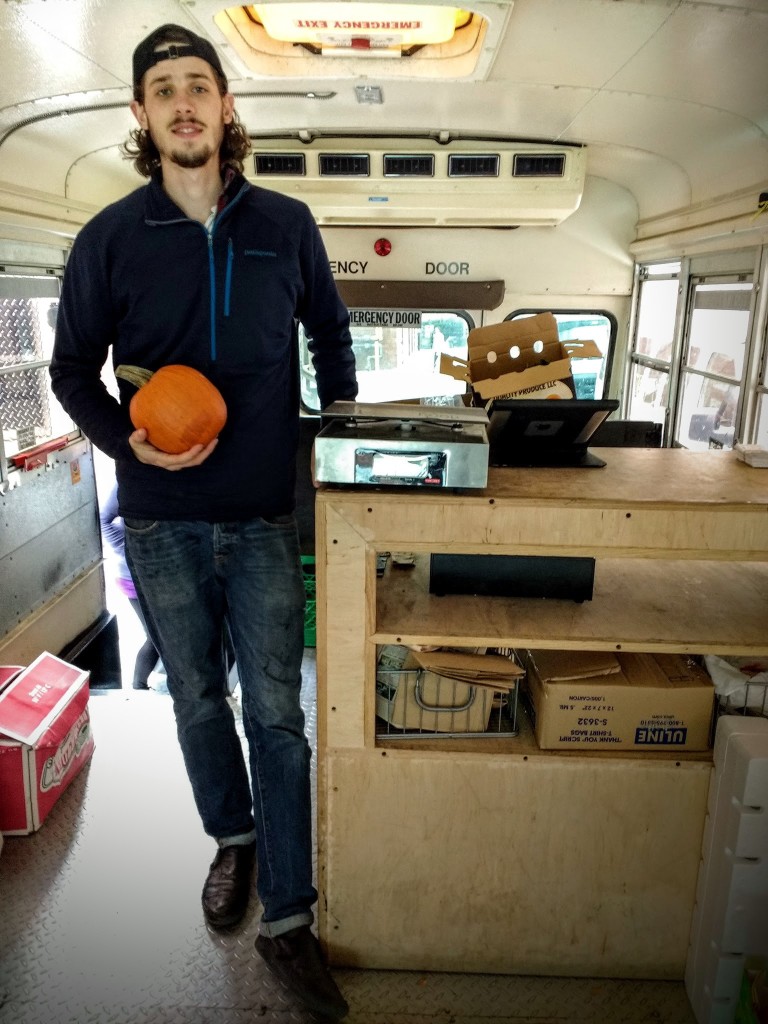Josh Trautwein noticed a disturbing trend while working as a health educator and program manager at MGH Charlestown Healthcare in 2013. The only grocery store in the neighborhood was closed for renovations, so there was nowhere for the families he was working with to shop for fresh food. The Northeastern alumnus, who graduated in 2010 with a degree in sociology, taught families about nutrition and healthy eating — but they couldn’t live out his lessons.
Trautwein realized a mobile store that could visit Charlestown and other areas in need of fresh groceries might be the start of a solution.
Along with other Northeastern alumni, Trautwein launched Fresh Truck’s first retrofitted school bus, with shelves and baskets of fresh produce replacing the rows of seats, at City Hall in July 2013. After three years of experimenting and expanding, the company continues to be a valuable asset throughout Boston.

Fresh Truck was initially funded by a Kickstarter and through Northeastern’s student-run venture accelerator IDEA, which allowed the team to run a three-month pilot program. The Kickstarter campaign exceeded its goal, raising $32,108. After stopping in 12 neighborhoods over four days each week, they closed up for the cold Boston winter to reflect and plan.
“[We] started as a benefit organization, then converted into a nonprofit to better make an impact around food access, rather than creating a profitable business that would have a smaller impact on the communities [we] wanted to reach,” said Annika Morgan, Fresh Truck’s managing director who graduated from Northeastern in May with a degree in business administration and entrepreneurship.
Besides the 12 weekly stops around Boston, the company also works with schools and health centers to run different events.
On a chilly, overcast October afternoon, a Fresh Truck bus rolled up to NEW Health, a North End Waterfront Health satellite clinic in Charlestown that opened up in December 2015.
“Since we’ve been here, we’ve found that food insecurity is a big problem,” explained Zach Goodale, a public affairs coordinator at the clinic. “The only grocery store in Charlestown is Whole Foods, which is out of the price range for most of our patients.”

Fresh Truck’s Program Director Mandi Dean said, “This is a way of supporting the health and wellness of patients at the center. It’s also nice to have a weekly market shop to be a consistent stop.”
A truck visits the clinic every Tuesday, but this particular day was also an event in which NEW Health partnered with other organizations to provide vouchers for its patients to use at Fresh Truck. Each attendee received a reusable grocery bag and a $5 voucher to use toward their bill.
That Tuesday afternoon was Laurice Simmons’ first time at Fresh Truck. She lives on Tufts Street, close to the clinic. “My doctor told me about this. It’s pretty good, the voucher is really nice. I go to Market Basket (in Somerville) usually; I don’t go to Whole Foods,” she said, holding her bag of cabbage, collard greens, potatoes, and other freshly bought produce.
In order to choose stop locations, Fresh Truck uses a combination of academic data around areas of food insecurity and community input. “We take into account affordability and concerns around neighborhood safety. We have two stops around the Charlestown housing development. Although academic data would say there’s a Whole Foods right there, affordability is a big issue,” said Morgan.
Whole Foods has deployed a mobile store called My Street Grocery in Portland, Oregon that aims to overcome access and cost barriers. My Street Grocery did not respond to request for comment about plans for other cities.
According to a case study on mobile grocery units by EcoDistricts, a nonprofit for urban regeneration and urban development, “Food must also be affordable and culturally appropriate for a neighborhood. Having the community involved in food selection, as well as the pairing of recipes and food preparation, can go a long way in ensuring success.”
Morgan explained how Fresh Truck strives to accomplish this. She said, “What we really need to focus on is celebration of neighborhood food culture and healthy eating. A lot of how we consume and prepare food comes from our families, how we learned to cook, and how we incorporate food into our lives.”
This past summer, Fresh Truck hosted an event in Dorchester sponsored by HoodFit, a program that encourages communities to exercise together.
“There was a cooking demo where we brought in elders from the neighborhood. They were telling stories of growing up, learning to cook and sharing with these kids. That was a really powerful way to show that food is part of your identity,” continued Morgan.
EcoDistricts’ report also cautioned that while grants are integral, a mobile grocery store’s financial model should be sustainable if funding diminishes.
Fresh Truck has funding from corporate sponsorships, grants and individual donors in addition to the sales revenue. “In general, there are two types of nonprofits: ones that have integrated revenue streams and ones that don’t,” explained Operations Manager David Cooch. “The ones with their own revenue streams are on the rise because they attract donors. We have small markup prices, but still make some money. Donors see that and know they can trust us more.”
Fresh Truck buys its produce wholesale from Boston-based Katsiroubas Brothers. Leftover food from the truck is donated to East Boston Soup Kitchen, Commonwealth Kitchen and other small businesses, such as food trucks.
A bus also stops on Leon Street at Northeastern on Tuesdays and Fridays, attracting students and the occasional other passersby.
Glenn Collins of Morristown, N.J., was waiting for his son and wife to finish a tour for prospective students when he had a craving for fruit.
“When I first saw [Fresh Truck] earlier today, I just thought it would be a mobile farmers’ market. I didn’t know they go out to communities that don’t have convenient grocery stores. It’s a great thing to have on campus, for kids to go around and grab something healthy to eat,” Collins commented as he ate an orange he bought on the bus.
Morgan said, “About 75% [of stops] are mission-driven and need-based, and the others are revenue generating to support our other stops.” Northeastern falls into the latter category. She continued, “We have a good customer base and lots of people know us on campus.”
Despite the convenience of a mobile store, the bus model poses different challenges. “Loading and unloading the bus is very painful and inefficient,” said Cooch, as each process takes about three hours to carry the goods by hand. “The school bus model is cool, but we could get trucks with docks to load pallets [instead of carrying goods by hand],” he added.
Morgan also mentioned how they want to operate seven days a week and expand their selection. Since Fresh Truck only carries raw uncut produce, the team wants to add refrigeration units for meat and dairy, as well as prepared food to “help homeless and displaced families,” said Morgan.
Still, the Fresh Truck buses have already established themselves as a much-needed option for healthy groceries in neighborhoods across Boston.
“Some of the best stories are from the more needy communities, where people really value the bus. When there’s a line out the door, it’s hard to hear those stories,” Cooch said. “But with these repeating stops, you see the same people every week, learn their names, and people appreciate it. It’s a really beautiful thing.”
Fresh Truck’s weekly market locations // Map by Erica Yee